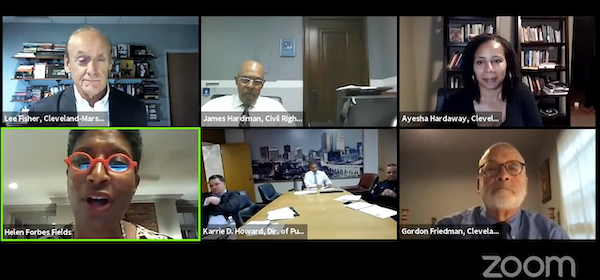The Neighborhood and Community Media Association of Greater Cleveland is providing monthly reports on a series of community conversations about the 2015 Consent Decree negotiated between the US Department of Justice and the City of Cleveland regarding the policies and practices of the Cleveland Police Department.
“If a citizen is stopped by the police while driving a vehicle and the police ask in an intimidating manner if they can search the vehicle and the citizen says, ‘yes,’ but is afraid to get out of the car and the officer finds contraband, is that a legal search?”
“As a woman, I have always been taught that if I’m being pulled over, I have the right to keep driving until I get to a well-lit area. Am I allowed to do that? How does the officer know my intent, and that I am not fleeing the scene?”
“Is the Monitoring Team just checking boxes or are they assuring that the Cleveland Police conform to the requirements of the Consent Decree?”
These were among the questions being asked and answered at the monthly conversations held online about the workings of Cleveland’s Consent Decree. The August meeting focused on “Search and Seizure.”
“…If the government becomes a lawbreaker, it breeds contempt for law; it invites every man to become a law unto himself; it invites anarchy. To declare that in the administration of the criminal law the end justifies the means — to declare that the government may commit crimes in order to secure the conviction of a private criminal — would bring terrible retribution...” — Justice Louis Brandeis
Toward the end of the August public meeting, panelist James Hardiman, Legal Director for the ACLU of Ohio, offered these closing remarks: “I believe that the three gentlemen representing the City have the best of intentions and I have the utmost respect for each and every one of them.”
He said, “But, my concern is often times with the police on the street—the ones that are trying to skirt the clear intent of the Fourth Amendment—and, in that regard, I want to quote Justice Brandeis from his opinion in Olmstead vs. the United States:
“…If the government becomes a lawbreaker, it breeds contempt for law; it invites every man to become a law unto himself; it invites anarchy. To declare that in the administration of the criminal law the end justifies the means — to declare that the government may commit crimes in order to secure the conviction of a private criminal — would bring terrible retribution...” -Justice Louis Brandeis
Hardiman reflected, “That was the dissent. Unfortunately, years afterward, we are still wrestling with the mentality among some law enforcement officials that the end justifies the means. It never does.”

Clockwise from top left: panelists Lee Fisher, Dean of Cleveland State University Cleveland-Marshall College of Law; James Hardiman, civil rights attorney; Ayesha Hardaway, law professor at Case Western Reserve University School of Law and deputy monitor for the Consent Decree; Gordon Friedman, criminal defense attorney; Karrie D. Howard [center], Cleveland safety director, and Helen Forbes Fields, executive vice president and general counsel, United Way of Greater Cleveland.
The next meeting in the series is Wednesday, September 8, at 6p. The topic will be the Cleveland Community Police Commission and Citizen Involvement.
How much input do Cleveland citizens have on the constitutionality, effectiveness and community-consistent values of our Cleveland Police services?
The Consent Decree between the City of Cleveland and the U.S. Department of Justice (DOJ) mandated a Community Police Commission (CPC) be established to bring community input in the process of police reform. The Commission’s charge is to win crucial community input on police practices to help ensure “that police services in Cleveland are delivered in a manner that is constitutional, effective and consistent with community values, while preserving officer and public safety.”
The public is invited and encouraged to participate in these sessions to help in the monitoring process. These conversations, sponsored by United Way of Greater Cleveland and the Cleveland NAACP, are conducted via Zoom on the second Wednesday of each month.
Helen Forbes Fields, Executive Vice President and General Counsel for United Way of Greater Cleveland, explained in closing remarks why Clevelanders should be particularly interested in September public meeting.
She said, “The CPC is composed of 13 members that represent the many and diverse communities within Cleveland. They also make recommendations to the Chief of Police and the City of Cleveland on policies and practices related to community and problem-oriented policing, bias-free policing and police transparency. No doubt, another robust discussion we have in store in September.”
Forbes Fields concluded the meeting with a call for Cleveland’s grassroots neighborhood and community residents to participate. “We thank each one of our panel participants, and community members for joining us on our mission to create a voice; to encourage engagement; as well as advance understanding of the Cleveland Consent Decree and of one another…registration is complimentary and open to all.”
To attend the next meeting, ask questions or voice your concerns, register for any of the three remaining Consent Decree public meetings by visiting unitedwaycleveland.org.
RELATED:
• • •• • •
Rich Weiss is vice president of the Neighborhood and Community Media Association of Greater Cleveland and publisher of The Tremonster.













